Existing User Log In
New User Registration
Register for a free account to gain full access to the VGChartz Network and join our thriving community.



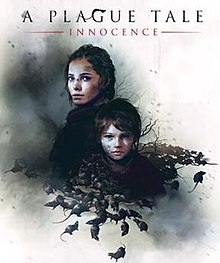

America - Front
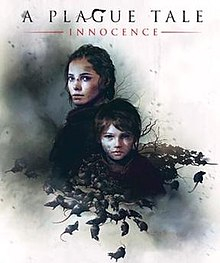

America - Back

Asobo Studio
Action-Adventure
 (Add Date)
(Add Date) (Add Date)
(Add Date) (Add Date)
(Add Date)
| Owners: | 0 |
| Favorite: | 0 |
| Tracked: | 0 |
| Wishlist: | 0 |
| Now Playing: | 0 |
Reviewer's Note: Since I can’t avoid bringing up some SPOILERS in this review, viewer discretion is advised.
If you're a developer that's most known as a support studio or licensed-game contractor, what would you do to break out of that mold? With cheery disposition, France-based Asobo Studio figured The Black Death would be appropriate inspiration for a new IP; somehow GaaS wasn't on its mind while thinking of highly infectious diseases. This was a team that received considerable funding (from Focus Home Interactive) to make a single-player, cinematic action-adventure game for the middle-market price of $50. That was impressive news on its own. Now, Asobo's vision has been given the 9th-gen upgrade treatment. This improvement doesn't remove any of its tougher fleas, but A Plague Tale: Innocence remains one harrowing ride.
Fall 1348 AD. The Hundreds Years' War, among the bloodiest in human history, is merely past elementary school at this stage. Amicia de Rune, an early-teenaged girl of French nobility, is hunting a pig with her father (Robert) and dog (Lion). This extended chase ends with an unknown force ravaging Amicia’s prize. What could’ve done such damage so quickly? Upon witnessing similar savagery against Lion, Amicia and Robert return to their homestead in Aquitaine. Soon thereafter, Inquisition troops force their way onto the estate to kidnap Hugo, Amicia's kid brother. While executing anyone impeding their plans, Amicia and Hugo narrowly escape their clutches. Now they must venture to a friendly doctor for safe haven.
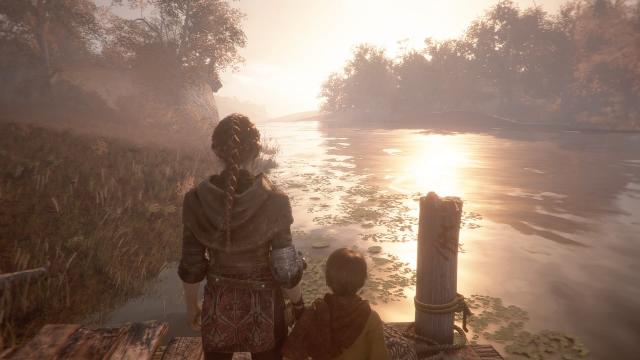
To its credit, the pacing is surprisingly fast and each successive event effortlessly builds up several integral gameplay components in tandem: slingshot training with dear old dad becomes handier than expected, down time at home provides opportunity for light exploration, and the simplified stealth still feels quite tense. This quickened set-up works for establishing the story's background too. Some terse dialogue between each of Amicia's family members realizes just enough to understand their archetypal role before moving forward. Although not all are clearly seen, most central adversaries are at the beginning. All of the individual elements established could feel too breakneck for some – especially compared to other cinematic games, but I liked how quickly Amicia's relatively comfy world goes to hell. It's probably painting a more honest light about anyone caught in such conflicts: things start to slowly go bad around you and then all in a hurry.
What of Hugo de Rune, the afflicted brother who Amicia's hardly ever seen? Due to the mysterious nature of his illness, Amicia's alchemist mother, Beatrice, wanted him kept away while she tried to discover a cure. Similar to the relationship between The Last of Us' Joel & Ellie, Hugo's first steps into a larger world are fraught with curiosity and confusion. The kid thinks horses simply blowing their noses means they’re sick. What gives with him? But as a strong familial connection starts forming, as he shifts from occasionally recalcitrant & immature to trusting, he blossoms into your brother. After all the insane circumstances along this journey, a genuine comradery forms between you, your brother, and your other companions.
The extensive sojourn cementing that development doesn't always feel organic. Although it doesn't necessarily reach an immersion-breaking point, certain plot or gameplay-inspired conveniences can interrupt the otherwise believable world. One such gameplay-tied example is when violence is the only option. After scripted chase scenes, light puzzle-solving, and so on, there comes a gut-wrenching threshold for Amicia to cross. It's all scripted very well, from cinematography to music; however, the scene right before it undermines that moment. To keep this vague: there's a similar issue with Miles Morales here that really got to me. I'm sure TV Tropes has a better word for it, but I like the term "artificial antagonism." Although there's better build-up here than in Miles Morales, I still don't think there was enough justification for it. Greater emphasis on emotional highs versus rigid consistency is a staple throughout the story and gameplay (more on that later).
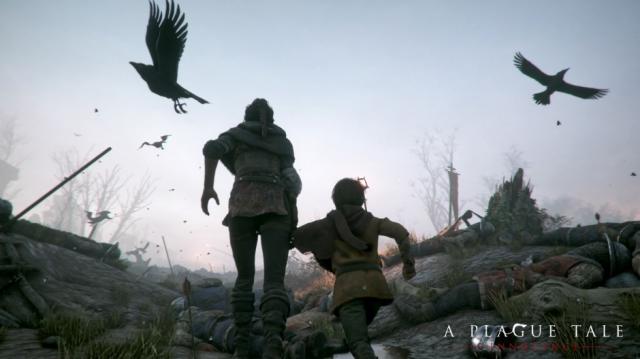
Fortunately that's easily achieved thanks to the presentation. I was gobsmacked by Plague Tale's IMDb actor list. I don't know what it is about cinema, television, or games, but European casting departments consistently seem more methodical in their actor choices. Logan Hannan and Edan Hayhurst, playing Hugo and alchemist apprentice Lucas respectively, are great fits for their roles – especially for their sizable screen time. Not to forget the rest of the solid cast, such as the wonderful lead Charlotte McBurney, but those two were standouts to me. This is of course complimented by great visual framing, effective cinematics, and Olivier Deriviere's rich soundtrack. Similar to Ramin Djawadi's "House Stark" theme (Game of Thrones), Deriviere's central composition, "A Plague Tale," perfectly captures the setting and tone. That tune immediately rushes to my head when looking at the box art.
Plague Tale's narrative does occasionally rely on artifice to reach its stunning conclusion, but its emotional peaks give enough justification for said blemishes. To make a setting-appropriate analogy: it's like a full-bodied wine. The dialogue can get overly wordy and perfunctory - and there might be some other quibbles - but the core is still a well-structured narrative with set pieces and presentation that hit well above their weight.
Recall that observation about "emotional highs versus rigid consistency"? This type of attitude permeates Plague Tale's game design. I think this nit-picky annoyance could be what makes or partially breaks engagement for players. But before that, the basics should be covered.
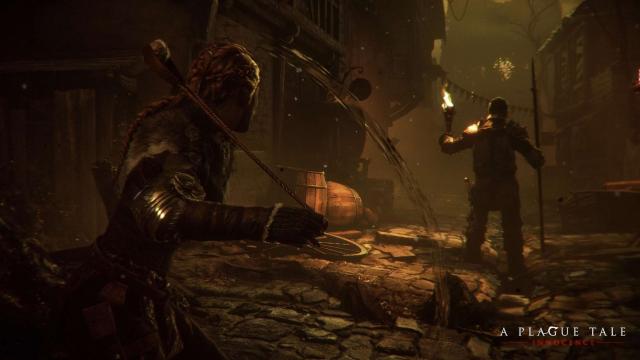
As brought up before, Plague Tale is a third-person stealth/action-adventure hybrid of sorts. Official listings like to bring up "survival-horror," but that element is practically negligible. What this translates to is a game with rudimentary stealth and a slingshot (with a soft auto-lock for heads), which is used for combat and puzzles. Amicia's arsenal increases once alchemical options are added, such as flaming stones and medieval chloroform. Whether considering slingshot or equipment, there's a skill tree as well. The options aren't expansive, but can provide more useful options for later encounters.
"How did you yammer on so long," you cordially ask, "without explicitly talking about the rats?" It's time to rectify that. Just knowing the setting could've clued you in on the "unknown force" that killed Lion earlier. Here, The Black Death isn't a scourge of micro-biotic viruses spreading illness across Europe, but an unrelenting, hungry rat horde. The group name "mischief of rats" radically undersells how devious and nasty these vermin are here. Once-pleasant countryside could be festooned with decrepit livestock in merely one night; with respect to humans, it's sometimes hard to gauge whether they did the deed or they're just cleaning up after The Inquisition’s slaughters. Unlike human adversaries, there is no bargaining or pleading to not be eaten alive by them.
The one thing stopping these rodents from total conquest is light, whether by the Sun or lantern fire. The core of Plague Tale's puzzle-solving against these creatures comes down to fire in some form. Since it repels them just outside a blaze’s glow, you'll often be maneuvering through them while holding a torch. Although stepping into darkness isn't immediate death, there's not much time to react before that happens. It's akin to "the floor is lava" type of rules; navigating past them either by lighting stuff or making platforms to avoid them. Most are mechanically easy to overcome but incredibly atmospheric, thanks to the ghastly amount of rats rendered on-screen and incredible sound design. The audio experience with headphones makes the ceaseless squeaking & skittering all the more uncomfortable. Even as more action elements are incorporated against these foes, their innate threat is never betrayed.
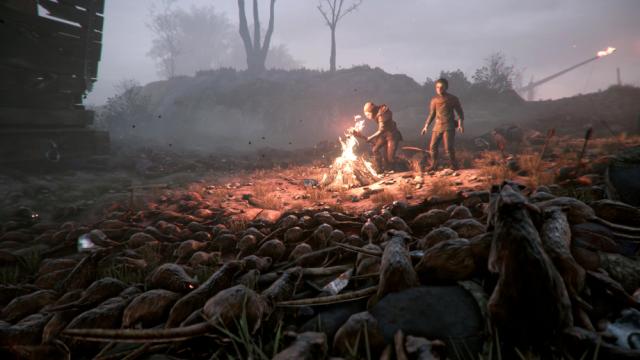
On paper, this foundation seems sound. The dynamic between stealth-action for The Inquisition and light-oriented puzzles for rats sounds fun, more so when these components coalesce. A key issue comes back to artifice. There are certain beats when the game design insinuates there's wiggle room to complete an objective, but it's a façade. Tossing stones into armor bins is the de facto method to lure guards, but slinging 100mph slingshot fastballs at animals doesn’t register. You start seeing level segments within rat-heavy chapters where handheld torches must be arbitrarily left behind or Amicia's convenient butterfingers douses the one she's carrying. This artificiality invades an important dramatic scene towards the end too; the story has to tell one thing while the game implies a player's skill can prevent any misfortune.
To be fair, this complaint may seem too nit-picky. Perhaps you think rigidity in service to Asobo's narrative ought to be followed to the tee. I can appreciate that. There shouldn't be a demand for everything to be a systems-driven immersive sim; that said, it becomes so easy to see the gameplay gears turning for me. It's annoying because there are a few achievement-tied choices where creativity is actually encouraged. I think its greater potential could've been discovered had those choices been more common.
Beyond its scripted strictures, Plague Tale has some other bad tendencies. Given how companionship is central to its design ethos, it's a shame to see occasionally dumb instances with friendly AI. Even though the story pacing works quite well, a few later combat scenarios get long-in-the-tooth for my liking. Close-quarters combat with Amicia's slingshot doesn't quite flow like it should, especially with one section utilizing enemy waves.
"Jack of all trades, master of none" is a reliable adage as we see more and more genre-hybrids these days. Does that apply here? Well, it's hard to measure the surprising final-act gameplay shift against other "masters;" outside of that, there's a recognizable formula here that doesn't stray too much outside a prescribed path. These templates result in a decent juggling of different gameplay ideas, a punctuating atmosphere, and several creative set pieces.
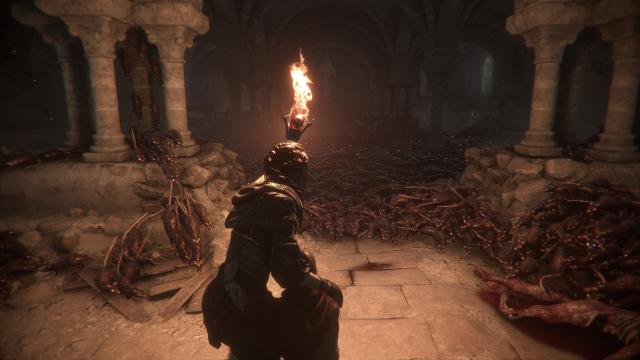
Despite showering praise on Plague Tale's storytelling presentation, an expanded look at its technical capabilities seems warranted too. Credit to Asobo: building an in-house engine is less alluring to many developers nowadays. Whatever concocted alchemy they used to flood my screen with rats had to tie in with that creative choice. It being an AA/middle-market type of game didn't stop me from appreciating its bevy of other great technical details. In respect to its 9th-gen upgrade, it's... more modest than other examples out there. It's a slightly cleaner polish than the Xbox One X version (that I remember), only now with a higher framerate. Similar to my return to GreedFall, it's one of those cases where you understand the team's scope makes it tough to rival blockbusters making new-gen polishes.
Less about comfortably hitting a 10-12 hour runtime, A Plague Tale: Innocence simply feels like a complete odyssey. There's a succinct beginning, middle, and end, capped with an earned promise for the developer's next adventure. The gameplay template buttressing this tale doesn't excel to the top of any selected genre, yet it's fashioned and remixed in ways I haven't previously experienced. Despite the fact that Asobo Studio's authoritative limits to progress through said story can foment aggravation, it's in service to an otherwise thrilling jaunt through a plague-ridden France.
Despite being one of newest writers on VGChartz, Lee has been a part of the community for over a decade. His gaming history spans several console generations: N64 & NES at home while enjoying some Playstation, SEGA, and PC titles elsewhere. Being an Independent Contractor by trade (electric, plumbing, etc.) affords him more gaming luxuries today though. Reader warning: each click given to his articles only helps to inflate his Texas-sized ego. Proceed with caution.









